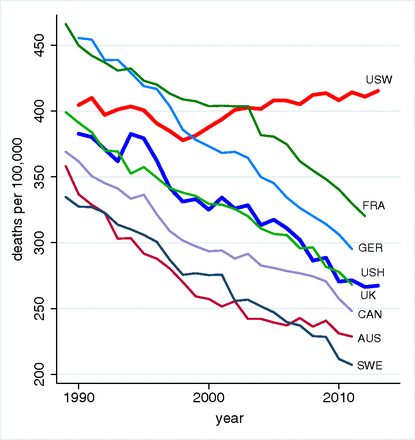-
-
-
![Michael Rosen]()
-
CIO Insights are written by Angeles' CIO Michael Rosen
Michael has more than 35 years experience as an institutional portfolio manager, investment strategist, trader and academic.
RSS: CIO Blog | All Media
Shock, Part 4 (Divided We Are)
Published: 12-21-2016
We began this series with a review of the likely economic policies and their implications of the new Trump administration, and discussed the long-term challenges investors face. We would have undertaken this exercise for a Clinton administration, but the election of Donald Trump represents a stark break from the broad consensus of the past 70 years favoring free (or freer) movement of goods, capital and people; the establishment of multinational treaties and supranational institutions to establish rules governing international relations; and enforcement of this world order primarily by the United States military.
As such, we expanded our review of the consequences of this election beyond the immediate implications for investors. Last week, we examined the foreign policy implications of a Trump presidency, how this likely marks the end of an era of American influence in world affairs (http://blog.angelesadvisors.com/2016/12/shock-part-3-the-end-of-pax-americana/).
The Trump presidency will likely have large consequences in world affairs. The impacts from reversing the processes of globalization, call it de-globalization, will play out over years, even decades. Some groups may benefit from this de-globalization, but the world as a whole will not, manifested economically by lower growth and politically by rising conflicts.
The election of Donald Trump is important internationally, but may be most consequential for American society, as it exposes the hideous wounds of political, economic and social polarization that have been festering for decades.
Research by Keith Poole (University of Houston) and Howard Rosenthal (Princeton) has shown that more than 90% of Congressional voting today is explained simply by ideology, the most in over a century. A decade ago, according to Pew Research, a minority of Democrats and Republicans viewed each other unfavorably. Today, nearly 50% of each party sees the other not just unfavorably, but as a threat to the national well-being.
Political polarization has not led, but rather reflects, the growing socioeconomic divide. Income and wealth are more concentrated in the top than at any time in a century. Note that this is true worldwide, just especially so for the US.
Globalization has made the world richer, but the benefits of globalization have been uneven. When growth was high, there was enough wealth to go around: the rising tide did lift all boats. But in recent decades, the gains from globalization have accrued mostly to the middle classes in developing countries and to the upper classes in developed economies. The middle class in the developed world has largely been squeezed out of the gains in global prosperity. Bruno Milanovic of The World Bank created this graphic of global income growth, which has come to be called the “elephant trunk” graph, showing the gainers and laggards in global income growth.

As distressing as political and economic polarization are, most disconcerting is the growing social divide. Elites attend the same schools, marry each other, and are more familiar with London and Hong Kong than with Wyoming or West Virginia (where Trump carried 70% of the vote).
Arthur Brooks of the American Enterprise Institute speaks of, not an Income Gap, but of a Dignity Gap. Over the past 50 years, the percentage of working men outside the workforce has more than doubled, from 10% to 22%. The employment-to-population ratio of men ages 25-64 is 6.8% lower today than in 1930 (which was not a good year, if I recall). Men without work are less likely to be married, and other than the handful of completely segregated monks, how else is one’s dignity defined but through work and family? Last year, Anne Case and Angus Deaton of Princeton shocked us with research (http://www.pnas.org/content/112/49.toc) that middle aged (45-54) white American men were the only demographic that experienced increased mortality over the past decade. Cirrhosis of the liver is up 50% since 1999, suicide up 78%, and drug and alcohol poisoning up 323% for this demographic (see second chart).


It’s not hard to connect all these dots. We’ve become a more divided society, as we’ve become richer. The post-war world order delivered prosperity to most people, until recently. In the past few decades, gains accrued to the billions in the new middle classes of developing countries, and to the rich. For the middle classes of the developed world, their incomes, their wealth, their dignity have stagnated at best, and deteriorated for many.
This is a failure of enlightened leadership of both sides of the political spectrum. Conservatives promised that the gains of wealth would be shared fairly, and offered no actions as inequality grew. Liberals chose to confiscate (I mean redistribute) wealth from the rich to the poor, hindered economic growth with more taxes and regulations, and further divided our society by pursuing identity politics, accentuating our differences over our common interests.
I don’t know if we will be able to bridge the many gaps in our society. Does anyone else see parallels today with Dickens’ description of the French Revolution:
It was the best of times, it was the worst of times, it was the age of wisdom, it was the age of foolishness, it was the epoch of belief, it was the epoch of incredulity, it was the season of Light, it was the season of Darkness, it was the spring of hope, it was the winter of despair, we had everything before us, we had nothing before us, we were all going direct to Heaven, we were all going direct the other way—in short, the period was so far like the present period….
Donald Trump fueled, promoted and capitalized on political, economic and social polarization, but he did not cause it. His election is a result of these divides. The consequences of his election will impact the economy and diminish US influence in world affairs. Donald Trump will not bring the country together for the simple reason that he does not see it in his self-interest to do so. No political leader has been able to do so, and I’m not sure any can or will.
Our best (only?) hope will come from ordinary people, reaching across the many divides in our country to see, to understand, to empathize and to commit ourselves to Lincoln’s “more perfect union.” Let that be our new year’s resolution.
Print this ArticleRelated Articles
-
![Beach Reading]() 13 Aug, 2024
13 Aug, 2024Beach Reading
Six new books for you, all fiction, all great. I hope you enjoy!The Sellout, Paul BeattyThis is possibly the most ...
-
![Updating the Triangle]() 3 Jan, 2018
3 Jan, 2018Updating the Triangle
Last year, I introduced my big picture framework of assessing the relative attractiveness of markets Inside the Triangle ...
-
![Chasing the Red Baron]() 31 Mar, 2017
31 Mar, 2017Chasing the Red Baron
You cant eat relative returns is an old aphorism. It sounds like it could come out of Poor Richards Almanac (Benjamin ...
-




